Pot Odds
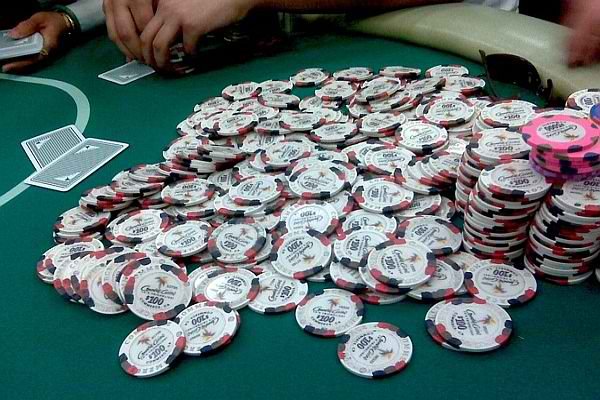
The key to any successful gambler or bookie.
When professional gambling is portrayed in the media, say a popular movie or whathaveyou... it needs to be made exciting and mysterious.
- "That guy's eye twitches when he's lying."
- "He has a good hand when he leans forward."
- "Bro sure talks a lot when he's about to fold."
These are called "tells".
And they are a very VERY small part of the game of poker. Almost inconsequential in the grand scheme of things. The vast majority of poker is boring math and statistical range simulation, especially when the opponents are middling. Just good enough to have a basic understanding of the mechanics and just bad enough to get rolled by the sharks.
The problem with how it actually works is that it's not exciting at all. It's quite boring in fact. I can say from firsthand experience that being a professional poker player was perhaps one of the most boring jobs of all time except during that one minute out of a hundred where everything was on the line and all the cards were out on the table. Other than that? Crickets.
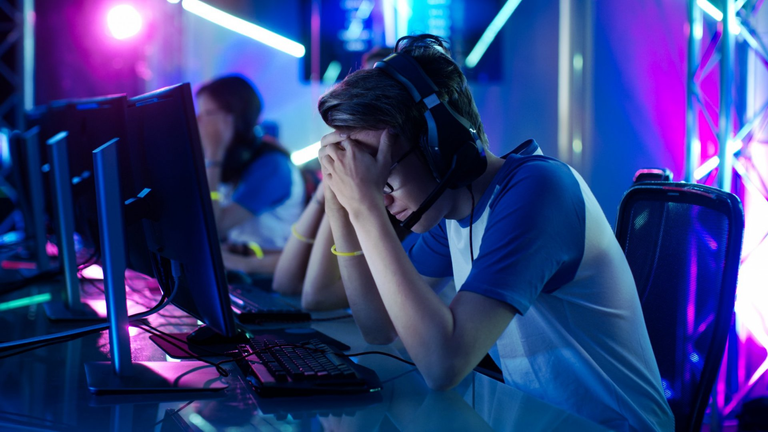
The sensationalized retelling is fake news.
In fact professional video game players and streamers feel the exact same way. The job is glorified as this cool and amazing thing. Wow he gets to play games for money how cool is that? Yeah well actually it is very stressful and it is very much a job. They don't tell you the finer details of signing a sponsorship contract as that's not exactly a glorious endeavor.
So what are pot odds?
My resident adviser (RA) at the SDSU college dormitory used to have a saying. "Never trust someone who will bet you 'even money'." Or at least that's the gist of it albeit far from a direct quote. Dude's name was literally Rich and he was this tiny Asian guy who was really good at telling stories and doing sleight of hand magic tricks. Everyone liked Rich. Fun guy.
In any case the point he was making was that when someone offers you a wager for "even money" it means that they are well versed in the betting landscape. Most people who place bets with their friends or acquaintances wouldn't even think about placing a bet in any other way. "I'll bet you 10 dollars that such and such thing happens."
Even Money is always implied between casual bets. If you win your friend owes you $10 and if you lose you owe your friend $10. It doesn't need to be explicitly stated. A declaration of "even money" implies that the person speaking has a lot of experience with betting and they're trying to trick you into thinking you have a really good chance to win even though you'll almost certainly lose. Classic hustling technique.
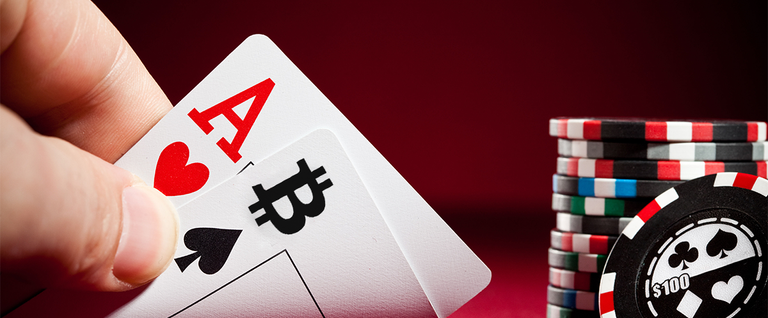
We still don't know what pot odds are, bruv.
Yeah I don't know what to tell you maybe this is just one of those posts where the introduction is the entire thing. Cutting to the chase: pot odds are a calculation that needs to be made when the bet is not "even money". It's typically when the prize (pot) is quite large and the personal bet we make is relatively small in comparison.
The most extreme example in this case would be a lottery. Say the prize pot of the lottery is $1,000,000 but your ticket only costs $1. If your chance of winning this lottery is better than one in a million you're actually making money on average (positive EV). Unfortunately a lottery is always going to give the players worse odds than one in a million in this case: that's exactly how they make their money; by raking the pot and taking a share for themselves while offering the players sub-optimal pot odds.

Circling back to poker, a classic example would be a flush draw. Say you've got four diamonds ♦️ and you just need one more for a hand that will almost certainly win. Well, your chance of getting what you want is about one in three if there are two cards to go (turn and river) and about one in five on the very next card.
For many this feels like a hopeless situation. It's very demoralizing to know that one's chance of winning the pot is only around something like 20%. It can feel like we should fold when we mathematically should not. This is due to the pot odds. If the amount of money we have to put in the pot is a lower ratio than our chance of winning then we should call every time.
For example of the pot is $100 and we only have to call $20 to stay in, these are pot odds of 5:1 (aka 100:20). For every $5 in the pot we only have to throw in another $1. Meanwhile, because we have a 20% chance to win this is actually 4:1 odds. We expect to lose 4 times and win 1. One out of five games total is 20%. Because the pot odds are better than the winning odds we should make this play every time we are able.
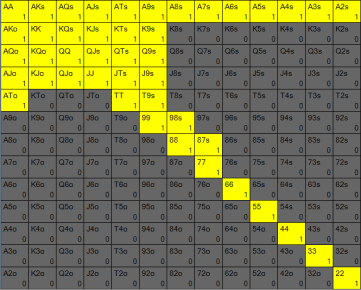
Implied odds
In the game of poker it gets even more complex as different scenarios come into play. Let's say you not only have a nice flush draw (ace high) but you also are last to act and everyone has just checked to you. No one has bet anything, what do you do?
A weak player would just check automatically for the free card and hope their flush comes. Most strong players are going to bet in that situation because everyone else at the table has already shown weakness, and a show of strength in that position that could easily push them off the winning hand.
Even though the player betting is almost certainly losing in the moment: this is not a bluff, but rather a semi-bluff. If a diamond comes: they win. If an ace comes: they probably win. If everyone folds: they win. That's a lot of "outs" that need to be considered.
So why am I bringing all this up?
Well I've been doing a good chunk of day trading lately and a lot of these concepts can be adapted from poker into the Bitcoin chart. These are universal gambling strategies. Simply being able to manage the emotions that arise from our bags moving up and down in a volatile manner every day is quite helpful. I have quite a bit of experience in this regard (over ten years when combining poker and crypto... maybe even 20 years... damn! old).

Take my current position for example.
- I shorted at $71,297
- Stop Loss set to trigger at $72100
- Take Profit set to $67050
So let's analyze this together.
Even though this is technically a 10x short on the official books the aggressive stop loss greatly increases the risk of liquidation and loss of the bet. In this case I'm betting hard that the price of Bitcoin is still trapped in a wedge for a while and will not exceed that $72k barrier. A 1% move up from the entry price would bust the position, so on a practical level this is much closer to an x100 bet. The official x10 nature of the collateral means I'll only lose 10% of the collateral if this position gets busted rather than all of it.

More accurately if we just look at the data that the exchange provides instead of trying to calculate it ourselves we can see that a stop-loss results in an 11% loss but a take-profit results in a 63% gain. So even if this bet only works 50% of the time I'll make a mint on the average. It's the perfect scenario to employ the pot odds logic we just talked about.
The ratio of 63:11 divides down to 5.7 to 1 odds. That means that even if a bet like this fails 5 times in a row it will still be profitable if the sixth try is a win. A 1 in 6 chance to win is 5:1 lose:win. Because the pot odds are 5.7:1 I would still make money on average with every 6 bets paying out 70% of the average bet made. The EV (estimated value) of this bet is +11.67% per bet (70/6).
Well that's confusing, let's try an example.
- I make a $100 bet six times.
- I lose 5 and lose $500.
- I win 1 and win $570.
- I placed six bets and find myself up $70 total.
- Each bet I placed made $11.67 on average.
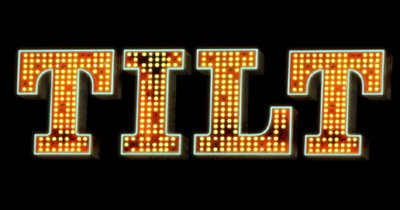
It all seems to check out.
Ultimately the most important thing to remember when trying to employ these strategies is the need to always keep a clear head and never allow oneself to become completely and utterly emotionally tilted due to a run of bad luck.
Imagine making 10 good bets and losing every single one just because of bad luck. This is incredibly demoralizing and often prompts us to "revenge gamble". We begin making worse and worse bets with increasingly higher leverage to "make it all back"... doubling down until the entire account is blown to smithereens and the bankroll is gone. If we had instead just kept making responsible bets, then a couple of random wins would have pulled us out of the hole we were in. These things happen all the time, on both sides.
As a hedge.
My current short is actually too safe of a bet. I borrowed $9000 and dumped it into perpetuals. My collateral is $900, and I can only lose $100 of that if the bet fails. When measured on it's own this is a pretty good bet, but when measured against all my other on-chain crypto assets it's basically nothing. If Bitcoin spikes and this short gets busted I will end up making thousands of dollars across my portfolio. Conversely and more importantly: if my short wins I'll be down thousands of dollars across my portfolio. If I truly wanted a legitimate hedged position I could have increased my bet size by quite a bit. I'm still learning. Slowly.
Conclusion
Attempting to gamble professionally is not for everyone. In fact I think mathematically only 10% of the participants are going to be able to pull it off. There's also a big difference between gambling for entertainment and gambling for work. If the moves being made feel boring and not exciting, then good. That's exactly how it should be. It's a job, not financial skydiving. Thrill seekers need not apply.
Pot odd logic is one of the most important concepts to keep in mind when placing bets that don't involve "even money". Sometimes boring math really does win out on the average. It may not be exciting enough to make it to the big screen, but it is good enough to make some money (or at least mitigate systemic losses).
Probably even less than that. In poker, a solid player can make money at low stakes just because there are so many weak players. Make money, yes. But not enough for it to be a job that pays the bills. For that, you have to play at least mid-stakes. And there, being a solid player just isn’t enough. At mid-stakes, many of your opponents are also at least solid players. At mid-stakes you’ve already got to have skills at putting your opponent(s) on a range of hands. And then for trying to move up to higher stakes you need to have the discipline to be brutally honest to yourself about money-management and psychologically able to drop back to mid-stakes when your bankroll demands it.
I would have made so much money if I could have just had the discipline to play $5 NL instead of $2 NL. There was this table that I would have absolutely slayed... the players there were worse than the $2 game. All action junkies.
And this was in Portland where they can't rake the table.
It's just a $10 cover charge.
So theoretically doing a 10-hour day there only costs $1/hour for the rake.
It was truly insane I miss Player Aces Club.
Not bad info from an old guy! You said it. Not me! Bring a trader does sound sexy! Maybe some day I'll take a chance and play with the cool kids!
Ideally I think we could create some kind of Swarm Intelligence trading app that would allow novice traders to copy the professional trades.
Wouldn't that muck up the odds?
Only if too many people were using it or frontrunning the moves.
But there's also the chance that a ton of people using it would make the moves even more likely to happen from self-fulfilling prophecy. There's only so much liquidity in the market. Taking something like this private is also a very real option.
But if something like this could move the market it would have to be huge.
Seems unlikely unless it actually worked very well.
Then it becomes self-cannibalizing.
Very interesting! Guess we'll see how things develop.
Good luck!
Most of my BTC shorts got burnt
More or less same luck in Pocker 😂
I worked with a guy, last name of Rich, in SD.
He owned some construction equipment and did contract work.
Rich had a bumper sticker. (that he cut up to make work)
If you are single, i am Rich
I really hate movies. They even try to make programming look exciting. Pressing the enter key while falling unconscious.
They are really bad at portraying poker, or any other casino games.
The only ones that were close to proper/actual is James Bond playing Baccarat. And usually he was only gambling for effect, to get some other opening.
hahahaha
But did you see... Swordfish?
Hack this unhackable thing in 60 seconds while getting fellatio!
GO!
Pew pew pew hacker man hack-a-doodle-doo!
Classic
This is what computer programmers need! Better user interfaces!
When you log in, there should be big screen that says AUTHORIZED!
Unfortunately, Cracking in reality is like 5 screens of computers going through dictionary databases looking for one that works.
I appreciate this educational post. Most of the discussion makes good sense to me.
However, the first example you provide, the lottery ticket for $1 with a pot of $1M, does not. It may make sense strictly mathematically, but it doesn't make sense on the ground, because the odds are so steep it would take lifetimes to get in the money.
Even if you were able to play the lottery with those odds, 1:1M, every day of your life, you'd have to be over 650 years old before reaching a 50/50 shot at winning.
For day trades, or poker hands, the EV makes sense, but not so much on the lottery.
Thanks!
So buy 100 tickets a day and reduce it to 6.5 years.
It is quite true that I only vaguely touched on this concept in the original post.
In order for pot odds to be valuable one must play the game many times.
In terms of poker this number starts around 10k hands and ends around 100k hands.
My hourly rate was very steady after 10k hands.
After 100k hands it's basically locked in unless improvements are made.
Of course it can take an hour to play 30 hands at a casino.
Which means 100k hands could be 3000 hours.
Maybe closer to 2000.
This post has been manually curated by @bhattg from Indiaunited community. Join us on our Discord Server.
Do you know that you can earn a passive income by delegating your Leo power to @india-leo account? We share 100 % of the curation rewards with the delegators.
100% of the rewards from this comment goes to the curator for their manual curation efforts. Please encourage the curator @bhattg by upvoting this comment and support the community by voting the posts made by @indiaunited.